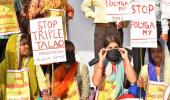'The BJP may no longer be in power after 2024, that doesn't mean we'll stop this campaign against polygamy.'
Jyoti Punwani reports.

Last week, the Bharatiya Muslim Mahila Andolan (BMMA) filed a petition in the Supreme Court asking for a ban on polygamy, which is allowed for Muslim men under the Muslim Personal Law.
On Tuesday, the feminist organisation, which was one of the petitioners in the 2017 triple talaq case, released a survey report, Status of Women in Polygamous Marriages and Need for Legal Protection.
"Those who argue in favour of polygamy ignore the woman who is at the centre of the issue," says Noorjehan Safia Niaz, a co-founder of the BMMA.
"BMMA looks at her as a human being, and a citizen, who must have the same protection under law that her fellow citizens do."
Indeed, that is exactly what the women interviewed in BMMA's survey say -- 84 per cent want the law that prohibits bigamy to be applicable to them too, and 73 per cent want Muslim bigamous men punished by law.
Pointing out that they are too powerless to approach the courts, that their jamaats support the men, and that the police say they can do nothing since it is no offence under Muslim law, they feel it is the government's responsibility to ensure that they break free from the dead weight of polygamy.
Most of the 289 women surveyed across 10 states are poor and uneducated. The statistics even from such a small sample are telling: 77 per cent of first wives are school dropouts.
The corresponding number for those who are second wives is 71 per cent. 29 per cent of first wives and 18 per cent of second wives had got married when they were less than 18.
While 42 per cent of first wives had no income, 45 per cent of second wives were in that situation.
For these women, whose worlds have always revolved around their homes and families, marriage defines their life. They aren't just financially and emotionally dependent on the man they've married, their status in society too, stems from being his wife.
When this man, who constitutes the fulcrum of their life, takes another wife, the foundation of their existence is shaken.
As one of them puts it:''mere pairon taley zameen khisak gayi (the ground disappeared under my feet).'
And there is no preparation for this shock: 72 per cent learnt that their husband had married another woman after the fact, and then, not from him.
Family members or friends informed them of this catastrophic change in their status. One woman actually found out only when she bumped into her husband with his second wife while she was returning from a family function. One was abandoned in the middle of a train journey by her husband.
Only 23 per cent of the husbands informed their first wife that they were going to marry again. A few said their parents were forcing them to do so, and promised to look after the first wife, but didn't do so.
In one case, the husband blamed the girl's parents for not giving her enough dowry and thereby giving his parents a reason to get him married again!
Parents also got their sons remarried if the first wife didn't give birth.
What are the reasons men marry a second time?
Falling in love was the commonest -- 35 per cent gave that as a reason.
Others disliked the first wife's physical appearance; one man didn't like her desire to visit her parents' home frequently.
Whatever the reason, what came through in the survey was the complete contempt with which these men treated the women they were married to, and the confidence with which they married a second time.
45 per cent threatened their first wives with divorce if they weren't willing to put up with the new situation.
The survey found 50 per cent of first wives suffering from long-term depression and physical ailments after her husband's second marriage, with as many as 43 per cent expressing tendencies towards self-harm.
Parents and even neighbours tended to blame them for being unable to "keep" their husbands.
Weeping incessantly, not eating, not being able to sleep and hence unable to take their children to school in time... Children dropping out of school was a common fallout, since most husbands (47 per cent) abandoned their first wife and children.
There were long-term psychological impact on children too. Like their mothers, children too, grew silent and withdrawn; some would try meet their fathers at their workplace only to be shooed off.
The mother stopped attending family functions; the children in turn stopped playing with friends for fear of being taunted.
A few women in the survey had managed to rebuild their lives. Though, being uneducated, they could only take up low-paying jobs such as domestic helps, they were proud of having broken out of the dependence on their husband.
One woman recounted how she rejected her husband's attempts to return to her after some years.
The survey showed that even a little support from their families went a long way in helping rebuild self-esteem.
***

Yet, polygamy is defended by orthodox Muslims because the Quran permits it. However, says Noorjehan, the Quran did so because that was a period of wars and many women were left widowed; marrying such women became a social obligation.
"That context no longer exists," she points out.
Moreover, while the Quran permits it, it does not encourage polygamy. Indeed, men are warned that if they feel they won't be able to treat their wives equally, they should marry only one.
Indeed, points out the Bharatiya Muslim Mahila Andolan survey, Islamic countries have enacted laws that have either prohibited polygamy or severely restricted it.
Another argument made in its favour is that if it is banned, Muslim men would, like their Hindu counterparts, have mistresses. Muslim Personal Law allows men to give the second woman the 'status' and rights of a wife.
"If being a second wife is so beneficial to women, then do way with Section 494 (bigamy) of the IPC (Indian Penal Code) altogether," says Noorjehan.
Statistically, census figures have shown, more Hindus are polygamous then Muslims.
"It's not about the numbers," says Noorjehan.
"It's about the legal protection Muslim women should get. I get calls from women in small towns saying what should I do, he's married again. There's nothing I can tell them. Legally, they can't do anything."
The BMMA's petition in the Supreme court had asked for a ban not only on triple talaq, but also on the practice of halala and polygamy, but the court took up only triple talaq.

"We want Muslim Personal Law to be completely reformed, not in this piece meal fashion," complains Noorjehan.
The BMMA wants Muslim Personal Law to be codified and have even sent their draft of the codified law to the government.
Its campaign to ban triple talaq got the BMMA a lot of abuse from their community: They were called RSS agents and their personal lives were brought up. This time, they are prepared for worse, as a PIL has also been filed by BJP member Ashwini Upadhyay demanding that polygamy be declared unconstitutional.
That apart, does the BMMA want a Hindutva party to pass laws reforming Muslim Personal Law?
"We haven't started working on this issue only after 2014," says Noorjehan.
"The BMMA was formed in 2007 and the reform of Muslim Personal law has been one of our main issues since then. The previous government didn't listen to our demands because of their vested interests; the BJP government is listening to it for its vested interest," she adds.
"The Congress didn't listen to Muslim women, it chose to listen to patriarchal groups. The BJP does the opposite. They both act according to their political agenda. But our agenda doesn't change. We are approaching the State, not the government," she explains.
"The BJP may no longer be in power after 2024, that doesn't mean we'll stop this campaign against polygamy."
Feature Presentation: Ashish Narsale/Rediff.com












 © 2025
© 2025